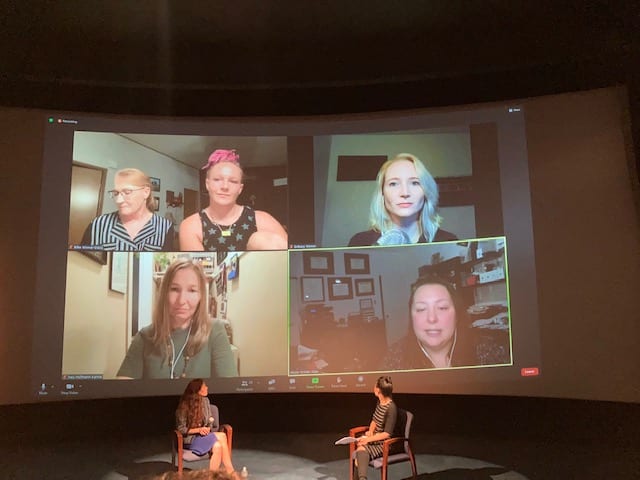At the Double Exposure Film Festival’s opening night event, National Security Agency (NSA) whistleblower Reality Winner spoke to the audience in her first public appearance since being released from prison in early June.
The film festival, hosted by news organization 100Reporters and now in its seventh year, kicked off with a screening of Sonia Kennebeck’s documentary “United States v. Reality Winner.” The screening, which could be attended both in person in Washington, D.C. and streamed virtually, was followed by a discussion with Winner herself, her mother Billie Winner-Davis and sister Brittany Davis, as well as Winner’s attorney Alison Grinter Allen and film producer Ines Hofmann Kanna.
Kennebeck’s gripping and moving film follows Winner’s journey after she decided to leak a classified document that showed evidence of widespread attempts by Russians to interfere with the 2016 U.S. elections. Winner came across the document while working for the NSA as a cryptologic linguist and anonymously sent it to a news outlet, but her identity was tracked down and Winner was questioned by the FBI in 2017. She was later arrested and charged under the Espionage Act. The audio and a reenactment of the FBI questioning in Winner’s Georgia home is interspersed with segments featuring Winner-Davis, her husband Gary Davis, and Winner’s friends and supporters.
The audience learns more about Winner and her life before joining the Air Force and working for the NSA: interviews with her sister Brittany Winner display their strong bond and shared sense of humor. The film showcases Davis and Winner-Davis’ unceasing fight to advocate for their daughter, who was sentenced to 63 months in prison and 3 years of supervised release in 2018 after pleading guilty. This is the longest sentence handed down for “an unauthorized release of government information to the media,” the film tells viewers. Featured in the film to give firsthand knowledge on the Espionage Act are other intelligence community whistleblowers Edward Snowden, John Kiriakou, and Thomas Drake.
The documentary provided updates about Reality at the time of its release, explaining that she contracted COVID-19 in the Texas federal prison she was held in. However, attendees of the post-screening conversation got to see Winner sitting next to her mother, safely in her parents’ home. The Winner-Davis family members, along with Allen and Kanna, joined the conversation via Zoom, while Tetiana Anderson of Brown Paper Bag Media moderated the discussion with Kennebeck in person.
During the conversation, Winner-Davis said she is “thrilled” to have Winner back home in the home confinement stage of her sentence. She mentioned that Winner wears a heavy ankle monitor, a constant reminder of her limitations and many restrictions that she still has to comply with until November, when she begins the 3 years of supervised release. Yet even when this stage begins, Winner will have to comply with rules and restrictions to fulfill certain requirements of the supervised release. Allen, Winner-Davis, and Brittany Winner all mentioned their quest to catch President Biden’s attention and urge him to pardon Winner, since she is still not yet free.
Anderson asked Brittany Winner about the importance of communication, especially since personal text conversations between the sisters was a big point of contention in the trial and featured in the documentary. She talked about how they understand that they are still being monitored to this day and provided insight into how she and her sister communicated while Winner was incarcerated. Brittany Winner urged the audience to be thoughtful about the ways in which they communicate and who might be privy to those conversations. Overall, she expressed happiness to have her sister back and relief in knowing that Winner was at home, safe, and available to message every day, albeit under the cloud of surveillance. “I have hope for the future,” Brittany Winner said about advocating for a pardon for her sister.
Kennebeck said that this is the first time she was able to view her film with an in-person audience and talked about her personal interest in whistleblowers. Kanna said that issues of government surveillance should be on the public’s minds and hopes that the film raises awareness of such issues — in the same vein, Kennebeck noted that she’s not sure that people would believe this story if it had not been immortalized as a documentary and people couldn’t see it for themselves.
Kennebeck discussed her directorial process and the specifics of making this film. Additionally, she talked about whistleblowers in the intelligence community and how case outcomes like the one in Winner’s case have the potential to have a chilling effect on other whistleblowers who might want to come forward. The takeaway from her film? Have courage. “What is the society we all want to have?” Kennebeck asked the audience.
At the end of the question-and-answer session, the audience got to hear from Reality Winner herself. She expressed gratitude for anyone interested in her story and thanked her family and attorney for their support. Winner also recognized Kennebeck and the momentous public screening of the documentary. “I wish this was not a story about me,” Winner said, but continued to give thanks for everyone’s support.
The Double Exposure Film Festival will continue until the closing event on October 17. The event also includes panels during the day featuring journalists and filmmakers that cover a variety of topics. WNN readers can get tickets to the virtual film festival using the discounted code: WHISTLEBLOWER.
